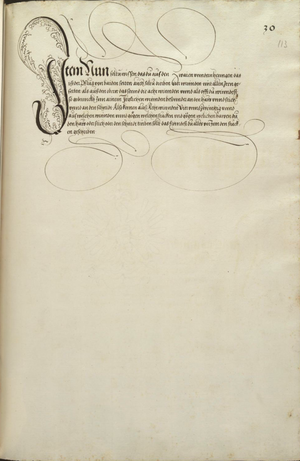|
|
You are not currently logged in. Are you accessing the unsecure (http) portal? Click here to switch to the secure portal. |
User:Kendra Brown/Latin Lew/Piece 006
Contents
Dresden
German
Transcription
[1] Item Nun soltu wissen das du aus den Zwaien vnndern henngen. das ist der Pflug von baiden seiten. auch soltu dreiben vier winnden. mit allen Iren geferten. als ausz den obern. das sennd die acht winnden. vnnd als offt du winndest. so gedennckh Inn ainem Jeglichen winnden besonnder an den haw vnnd stich. vnnd an den schnidt / Also komen ausz Acht winnden. Vier vnnd zweintzig. vnnd aus welichen winnden vnnd gögen welchen stucken vnd gögen welichen hawen du den haw oder stich oder den schnidt treiben sollt. das finndest du alles vor Inn den stucken geschriben.
Sandbox
- Hör was da schlecht ist
- ficht nit Linck ob du recht bist
- Vnnd ob du linckest
- In dem fechten du auch ser hinckest
- Das Ist ain Guotte Leer,
- Vnnd trifft an ainen Lincken vnnd ainnen Rrechten,
- vnnd wisse das,
- wie du solt hawen,
- das man dir die schweche,
- Inn dem Schwert,
- Inn dem ersten haw nit angewinn,
- Vnnd das vernim also,
- Wann du mit dem zufechten zu dem Mann kumpst,
- bistu dann gerecht,
- vnnd willt starck fechten,
- So haw mit namen den ersten haw nit von der lincken seiten,
- Wann er ist schwach,
- vnnd magst mit nichten,
- wider gehalten,
- Wann er dir starck anbindt,
- oder hawstu von der Rechten seiten,
- so magstu wol starckh widerhallten,
- vnnd am Schwert Arbaiten Was du wil
English
Sandbox English from German
Hear what is bad [about] that. Do not fight left if you are right [handed]. If you strike to the left, in fencing, you will always limp behind quite [slowly].
1. This is a good lesson
2. and relates to a left-hander and a right-hander.
3. and [you] should know,
4. how you cut
5. so that the opponent does not gain the weak
6. in your sword
7. in the first cut against you.
8. And comprehend this: 9. When you approach the opponent in the onset 10. and you are right-handed 11. and want to fence strongly, 12. then, in particular, do not cut the first cut from the left side 13. because it is weak 14. and you cannot resist 15. with anything 16. if he binds strongly on you. 17. Or if you strike from the right side 18. you are well able to strongly withstand 19. and you can work whatever you want on the sword.
Smooth English from German
This is a good lesson, and relates to a left-hander and a right-hander: [you] should know how to cut so that the opponent does not gain the weak in your sword in their first cut against you. And comprehend this: When you approach the opponent in the onset and you are right-handed and want to fence strongly, then, in particular, do not cut the first cut from the left side, as it is weak and you cannot resist if he binds strongly on you. But, if you strike from the right side, you are well able to strongly withstand and you can work whatever you want on the sword.
Munich
Latin
Transcription
[4] Si feriundo ad hostem accesseris, ense regendo ne cesses, eius ictum expectans sed semper exerceas. Nam omnes Athletae, qui id faciunt, Athletica non gaudeant, quoniam saepissimé laeduntur.
Sandbox
- placeholder
English
Sandbox English from Latin
- placeholder
Smooth English from Latin
Placeholder text
Notes
- The first section relates to *why* you cut at a particular side, and is missing from the Latin.

